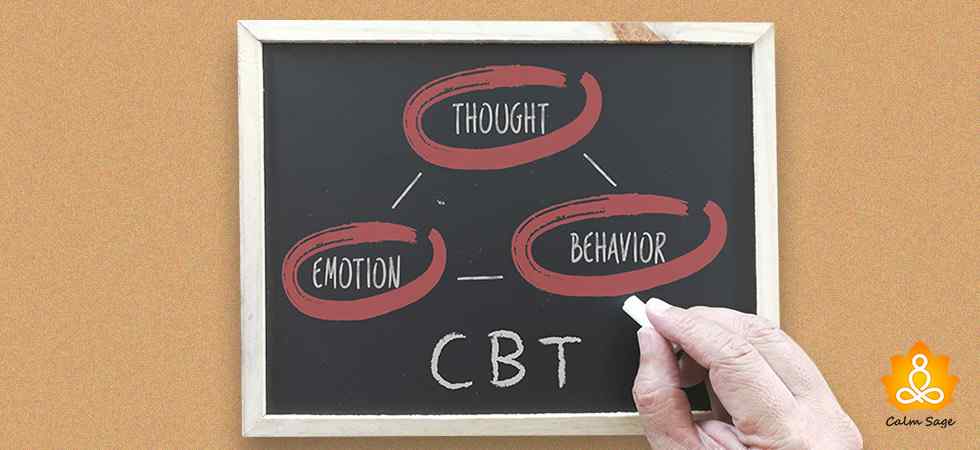5 Commonly Used CBT Techniques To Combat Mental Health Issues!

Cognitive behavioral therapy (CBT) is one of the most commonly used talk therapy, psychotherapy. CBT is said to work miraculously for a lot of mental health conditions like anxiety, depression, restlessness, bipolar disorder, post-traumatic stress disorder, and many more.
CBT includes a lot of techniques and tools that address different aspects of many mental health issues and conditions. These techniques usually begin showing results in a short span but depending on your symptoms it can take a bit longer too.
However, the best part about cognitive behavioral therapy and its techniques is that they are easy to comprehend and can stay with you even after you’ve stopped taking therapy. Therefore, we can easily understand the CBT techniques and use them if need be.
Today we will look at some of the commonly used CBT techniques but first, let’s give a quick look at the basic concept of cognitive behavioral therapy…
What Is Cognitive Behavioral Therapy?

Cognitive behavioral therapy is a type of psychotherapy that deals with two aspects of your personality that might be worsening your mental well-being. The CBT techniques target both the cognitive aspect of an individual and the action or behavioral aspect of an individual.
Cognitive behavioral theorists believe that we all have some neural pathways and along those pathways we form our reactions and responses. Through CBT techniques the faulty neural pathways are shifted to more useful and productive neural pathways.
Cognitive behavioral therapy also works on your thought process. CBT techniques are known to be able to change your negative thoughts into positive ones. These techniques also help you rectify the actions and behaviors that are causing you pain and trouble.
Also read: The Pros & Cons Of Cognitive Behavioral Therapy (CBT)
Cognitive Behavioral Therapy Techniques
Cognitive behavioral therapists focus a lot on the thought process of an individual because they believe that our beliefs and thoughts play a vital role in worsening or improving our mental condition.
Therefore, most of the techniques used in CBT focus on rectifying or redirecting your thoughts and feelings. It completely depends on what kind of issue you’re dealing with and how you and your therapist would like to approach the problem.
Let’s have a look at some CBT techniques that can help you improve your mental health condition;
1. Cognitive restructuring or reframing
Most of your symptoms worsen because of constant negative thinking. Cognitive restructuring focuses on reframing your thoughts in such a way that they no longer provoke stress.
Your therapist will ask you some situational questions and analyze your response. That analysis will help you and your therapist identify the negative thought process. Once that is done, the therapist will help you in reframing those negative thoughts more positively and productively.
2. Guided discovery
Guided discovery is a very useful CBT technique as it helps in broadening your thought process. Your therapy will again ask you some questions to get an understanding of your thoughts and limiting beliefs.
Once that is done, the therapist will then question your beliefs and ask you to provide evidence for your assumptions. This exercise will help you understand what is limiting you and help you gain a broader spectrum of your thoughts and beliefs.
3. Exposure therapy
This CBT technique is generally used to help an individual deal with fears and phobias. The therapist will help you identify your irrational fears and slowly expose you to your fear so that you can learn to cope with the anxiety.
The exposure will gradually increase as you start coping with the initial exposures. Exposure therapy continues till the time you learn how to cope with your anxiety when in complete exposure to your phobia or fear.

4. Journaling and thought records
Journaling or writing down your thoughts is one of the best ways to explore and get in touch with your thoughts and feelings. It helps in understanding and uncovering some problematic thoughts that you may not have been consciously aware of.
Your therapist will ask you to write down all your negative as well as positive thoughts that come to your mind during the time between your sessions. It will help you identify triggers as well as your emotional responses to various situations that occur.
5. Activity scheduling
In this CBT technique, you are supposed to schedule some activities that you have been ignoring for a long time. Putting the activity up on your calendar helps you be better prepared for it and increases the chances of you getting it done.
Activity scheduling mostly helps when your mental health condition limits you from being productive. Other than important tasks you can also schedule activities that bring joy to you because such activities give you something to look forward to.
What Issues Can CBT Techniques Help Us With?

Cognitive behavioral therapy techniques can help us with a series of mental health issues. Most of our mental health conditions are manifested by our thoughts. CBT techniques specially target those problematic thoughts and productively reframe them.
CBT techniques can help you combat and cope with regular issues in life. You don’t always need a medical diagnosis to start cognitive behavioral therapy. The CBT techniques can help you deal with your everyday problems as well.
Let’s have a look at the issues that CBT techniques can help us with;
- Helps in managing powerful emotions like anger, guilt, etc.
- Helps in dealing with grief and related issues
- Helps in managing your symptoms and reduces their effect
- Helps in dealing with your physical health issues as well
- Helps in resolving internal and external conflicts
- Helps in developing assertiveness
- Helps improve your communication issues
Mental health conditions that can benefit from CBT techniques;
- Anxiety
- Depression
- Post-traumatic stress disorder
- Obsessive-compulsive disorder
- Bipolar disorder
- Addiction and related concerns
- Phobias
- Eating disorders
- Sleep-related disorders
- Sexual disorders
- Physical pain
- schizophrenia
That’s All Folks!
I hope you found this blog about CBT techniques helpful, informative, and interesting. Do share this blog with your friends and family so that we can all understand how useful and effective CBT techniques are.
The best thing about CBT techniques is that they cater to a wide range of issues. Anyone can benefit from cognitive behavioral therapy techniques even when they don’t have a medical diagnosis.
Thanks for reading.
Take care and stay safe.
Next Read:
The Pros & Cons Of Cognitive Behavioral Therapy (CBT)
Complete Self-Help Guide: Social Anxiety Activities To Get Better




















